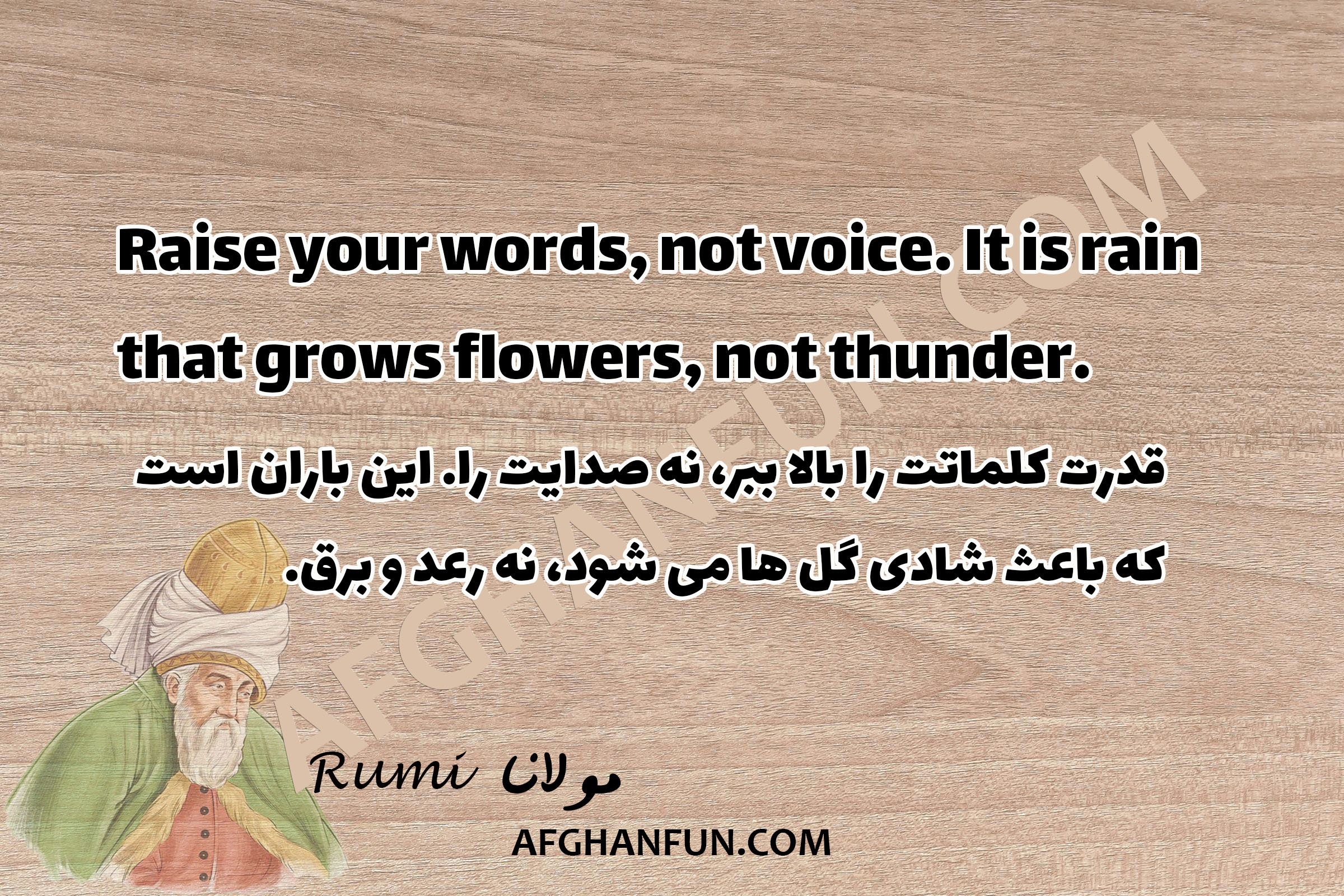Rumi on Growth: Nurture with Kindness, Not Noise.
Raise your words, not voice. It is rain that grows flowers, not thunder.
rumi
The Gentle Path to Growth: Rumi’s Wisdom on Words.
قدرت کلماتت را بالا ببر نه صدایت را، این باران است که باعث شادی گل ها می شود نه رعد و برق.
مفهوم اصلی: این جمله بر اهمیت کلمات و تأثیر آرام و پیوسته آنها بر روی دیگران تأکید میکند. مولانا با تشبیه کلمات به باران و صدا به رعد و برق، نشان میدهد که کلمات با نفوذ آرام و مداوم خود، همچون باران، میتوانند تغییرات مثبت و پایدار ایجاد کنند.
پیام اخلاقی: این جمله به ما یاد میدهد که برای تأثیرگذاری بر دیگران، نیازی به فریاد زدن و پرخاشگری نیست. بلکه با انتخاب کلمات مناسب و بیان آرام و مؤثر میتوانیم به هدف خود برسیم.
کاربرد در زندگی: این جمله در زمینههای مختلفی مانند ارتباطات بینفردی، رهبری، آموزش و هنر کاربرد دارد.
Growth Through Gentle Words: Rumi’s Timeless Lesson.
Қудрати каломатро баланд бардор, на овозатро. Борон аст, ки гулҳоро шод мекунад, на раъду барқ.
МАВЛОНО ҶАЛОЛУДДИН МУҲАММАДИ БАЛХӢ
Маънои асосӣ: Ин ибора ба аҳамияти калимот ва таъсири ором ва доимии онҳо бар дигарон таъкид мекунад. Мавлоно бо муқоисаи калимот бо борон ва раъду барқ, нишон медиҳад, ки калимот бо нуфузи ором ва доимии худ, мисли борон, метавонанд тағироти мусбат ва пойдор эҷод кунанд.
Паёми ахлоқӣ: Ин ибора ба мо меомӯзад, ки барои таъсир расонидан ба дигарон, ба фарёд задан ва ҷанҷол кардан ниёз нест. Балки бо интихоби калимоти мувофиқ ва ибрози ором ва самаранок метавонем ба ҳадафи худ бирасем.
Истифода дар ҳаёт: Ин ибора дар соҳаҳои гуногун ба монанди муносибатҳои байни шахсӣ, роҳбарӣ, таълим ва ҳунар истифода мешавад.
Gentle Rain of Words: Rumi’s Metaphor for Growth.
أرفع كلماتك لا صوتك. المطر هو الذي يفرح الزهور، لا الرعد.
مولانا جلال الدین محمد الرومي
المعنى الرئيسي: تؤكد هذه الجملة على أهمية الكلمات وتأثيرها الهادئ والمستمر على الآخرين. يشبه مولانا الكلمات بالمطر والصوت بالرعد، مما يدل على أن الكلمات بتأثيرها الهادئ والمستمر، مثل المطر، يمكن أن تحدث تغييرات إيجابية ودائمة.
الرسالة الأخلاقية: تعلمنا هذه الجملة أنه للتأثير على الآخرين، لا نحتاج إلى الصراخ والعدوان. بل يمكننا تحقيق هدفنا باختيار الكلمات المناسبة والتعبير الهادئ والفعال.
الاستخدام في الحياة: تستخدم هذه الجملة في مجالات مختلفة مثل الاتصالات بين الأفراد والقيادة والتعليم والفن.
“Raise your words, not your voice. It is rain that grows flowers, not thunder.”
A Deep Dive into Rumi’s Powerful Metaphor
This evocative quote from Rumi offers a profound insight into the nature of effective communication and personal influence. Let’s break down its layers of meaning:
The Power of Words:
- Words as Seeds: Rumi compares words to seeds. Just as a tiny seed can grow into a magnificent tree, a well-chosen word can cultivate profound thoughts and emotions.
- The Subtlety of Influence: Unlike thunder, which is loud and jarring, rain nourishes silently and gradually. This suggests that true influence comes from gentle, thoughtful communication, rather than aggressive or forceful tactics.
- Quality Over Quantity: The emphasis on “raising words” rather than “raising voice” highlights the importance of quality over quantity in communication. It’s not about how much you say, but what you say and how you say it.
The Limitations of Force:
- The Ineffectiveness of Force: Thunder, while powerful, is often destructive and temporary. It may startle or frighten, but it does not nurture or inspire.
- The Power of Gentleness: Rain, on the other hand, is gentle yet transformative. It nourishes the earth and sustains life. This suggests that a gentle, nurturing approach is more effective in bringing about lasting change.
The Spiritual Dimension:
- The Soul as a Garden: The image of flowers growing from rain suggests that our inner selves are like gardens that need to be nurtured.
- Spiritual Growth: Rumi’s poetry is often filled with spiritual symbolism. In this quote, the growth of flowers represents spiritual growth, which is cultivated through gentle, mindful communication and meditation.
Practical Implications:
- Effective Communication: This quote offers valuable advice for anyone seeking to improve their communication skills. It emphasizes the importance of choosing our words carefully and speaking with clarity and compassion.
- Leadership: Leaders who can inspire and motivate others often do so through their words. This quote suggests that a leader’s true power lies in their ability to communicate their vision in a way that is both inspiring and persuasive.
- Personal Relationships: In our personal relationships, the way we speak to one another can make or break a connection. By choosing our words carefully and speaking with kindness and respect, we can create deeper, more meaningful relationships.
In conclusion, Rumi’s quote offers a timeless reminder of the power of words and the importance of using them wisely. By elevating our words and communicating with gentleness and clarity, we can cultivate positive change in ourselves and in the world around us.











